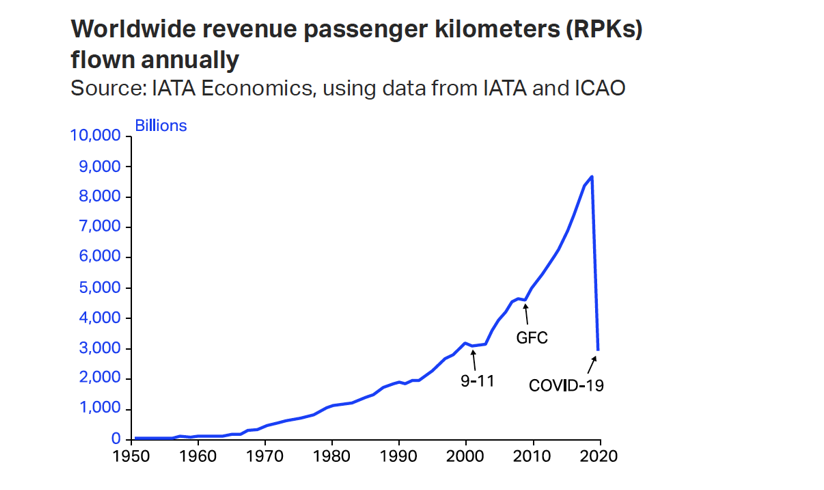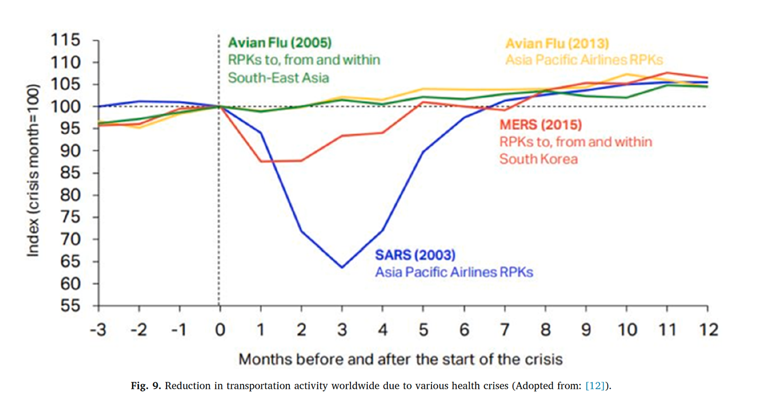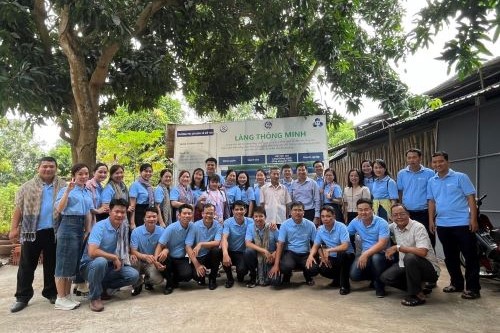![[Podcast] Assistance from ICTs for Aviation Connectivity Restoration – Part 1: Looking Back at the Impacts from the Global Pandemic](/images/upload/img_background/ueh-bg-095043-100322.png)
[Podcast] Assistance from ICTs for Aviation Connectivity Restoration – Part 1: Looking Back at the Impacts from the Global Pandemic
Looking back at the period of the Covid-19 pandemic with its global effects, it can be recognized that the aviation industry area has been affected rather badly. However, in another aspect, restrictions on exposure have promoted the application of information and communication technologies (ICTs) which are widely applied in automation as well as aviation business data exchange and analysis. In part 1 of this article, the author analyzed the importance of the civil aviation industry to the economy as well as the impacts of the Covid-19 pandemic towards this sector.
The importance of civil aviation
The use of air transportation in the travel and tourism industry is, currently, an increasingly popular mode of transportation in the world and in Vietnam. One of the reasons is to bring convenience with fast travel time, safety, less fatigue compared to other means of transportation. In terms of cost per Kilometer (km) or mile, this method is the cheapest. In fact, the cost of air travel of passengers is getting cheaper and cheaper over the years, non-stop flights save time and increase choices for passengers. In according to IATA’s statistics in Annual Review 2019, airlines regularly connect approximately 22,000 city pairs in 2018, an increase of more than 1,300 city pairs compared to that in 2017. From that, it indicates practical benefits and the convenience that the airline industry brings in connecting destinations, serving not only commercial business purposes but also recreational travel services and cultural exchange across destinations around the world.
It can be recognized that the rate of flight safety is increasingly guaranteed by airlines and with the great help of the application of information technology solutions. In according with NATII Report, after the disappearance of Flight MH370, from November 2018, ICAO decided to adopt a new standard for flight operators to provide the aircraft’s position every 15 minutes through ICAO (ICAO’s Normal Aircraft Tracking Implementation Initiative - NATII). It is expected that the new system and advanced technology will help increase global flight monitoring capabilities and ensuring the safety of passengers.
The aviation industry strongly applying ICTs in customer services
The aviation industry, like other service and tourism industries, applies information technology in effective revenue management and customer relationship management, ensuring safety and security for the industry at the early period. In the current trend, airlines are distributing online through their official websites, or intermediary distribution websites listed as Gotogate, Cheapflights, Airtickets, or mobile applications listed as Skyscanner, Traveloka without going through traditional agency channels.
In order to keep up with the trend, airlines are increasingly applying ICTs (Information and Communication Technologies) in customer services as well as effective internal management, helping airlines reduce management costs. management as well as hiring workers. In addition to the fact that customers can now book tickets and pay online, passengers can request special services, meals, special luggage through the website or email, the application is set up on the smartphones without having to go directly to the ticket counter or representative office or do online check-in and change or refund tickets, which previously could only be completed by the operators on GDS. This is to indicate the impacts of the application of ICTs on customer service as well as effective and cost-effective management. In addition, the current application of information technology in the aviation industry brings usefulness in ensuring flight safety and security through the management of passenger data and accompanying luggage on each flight through the data system stored at the control center.
To further facilitate travelers, IATA launched One ID in 2018, an initiative aiming at smooth and safe handling of passengers from airport gate to flight gate. One ID introduces a collaborative identity management platform that encompasses all guest journey processes and stakeholders. Passengers’ identities are verified early using trusted digital biometric identification technology and authentication data is made available to stakeholders on a permission-knowing basis (IATA, Annual Review 2019). One ID eliminates the procedure in which passengers have to present travel tokens multiple times, resulting in saving time and human resource.
The impacts of the global pandemic on the air transportation industry
In 2020-2021, when the Covid-19 pandemic appeared and swept, the aviation industry faced the most difficult period in history since the 2nd World War. In the continuous development of the economy and trade relations, tourism development among countries, the Covid-19 pandemic has changed the whole perception of ‘tireless birds"’ and airports that never sleep around the globe. Never before have airports been so empty and empty as in outbreaks since the disease appeared at the end of 2019 in Wuhan, China with a strong global outbreak in March 2020. In the past, although the aviation industry has been hit hard by the terrorist attacks of September 11, 2001 and the global economic crisis of 2007-2008, there have been no events that have made RPKs (revenue passenger kilometers) worldwide to decline by 66% as that of 2020 (IATA, 2020).

Figure 1. Worldwide sales in RPKs – Revenue passenger kilometers over the 1950-2020 years. Source: IATA (2020).

Figure 2. Decline of air transport around the world during health crises. Source: IATA, “IATA Economics’ Chart of the Week,” Report, 2020.
The impact of the pandemic on the aviation industry by curfew orders, travel restrictions and close contact of countries around the world is presented through the following studies and data:
In terms of stock prices, in the study of S. Maneenop & S. Kotcharin (2020) of a survey of 52 airlines in Asia, Europe, Australia and North America, for South America, Chile was selected as representative and Africa is South Africa, although there is only one airline in these two countries, compared to the selection criteria in other continents (there must be at least 4 airlines for each country); This total representative sample is equivalent to more than 50% of the world’s airlines doing business in the travel and entertainment sector (103 is the number listed under SIC 4512 April 2020 air transportation code). As for the announcement of the first case outside of China on January 13, 2020, it was underestimated without much impact on the share prices of companies. By the outbreak of the epidemic in Italy (February 21, 2021), cumulative abnormal returns, with a decrease by 7.84% for 5 consecutive days, was considered the first strong response to the pandemic. Until the event that Former President Donald Trump announced an entry ban for passengers from 26 European countries (March 11, 2020), the cumulative abnormal profit was negative 24.42% within 5 days and the gap was very wider, compared to that of the intrinsic value of the stock.
Reduced revenue in international passenger transport, higer than that of domestic and international freight. Countries apply travel restrictions to prevent the entry of the virus from outside. RPK began to slide in February, free fall in March and April is estimated to be decreased by 98% compared to the same period of the previous year. Until September 2020, the global RPKs remained at 89%. compared to that of the same period in 2019 (IATA, 2020). Freight revenue has limitedly decreased because it plays an important role in maintaining global supply chains and is responsible for transporting medical equipment and pharmaceuticals to countries.
• More than half of the 87.7 million aviation jobs are threatened with job loss in 2020.
• Burdens on the government because of grants to airlines listed as payroll assistance, loan guarantees, tax support and direct loan grants. The total figure in 2020 is up to 173 billion USD (IATA, 2020).
• With an on-board air filtration system that circulates every 20-30 times an hour, 99.9% of bacteria are killed, the research by Freedman & Wilder-Smith in The Journal of Travel Medicine shows that the risk is infected on the plane is low, provided that passengers wear masks and strictly disinfected water. Nevertheless, 83% of passengers choose not to fly if quarantine is in place.
Please refer to full research Assistance from ICTs for Aviation Connectivity Restoration at here. Author: Nguyễn Thị Thu Thuỷ – Faculty of Tourism, UEH School of Business.
This writing is in series of spreading research and applied knowledge from UEH with “Research Contribution For All – Nghiên Cứu Vì Cộng Đồng” message, UEH would like to invite readers to follow Newsletter ECONOMY NO #61.
News, photos: Author, UEH Department of Marketing – Communication
Voice of: Ngọc Quí






